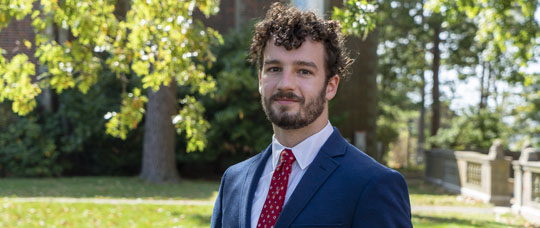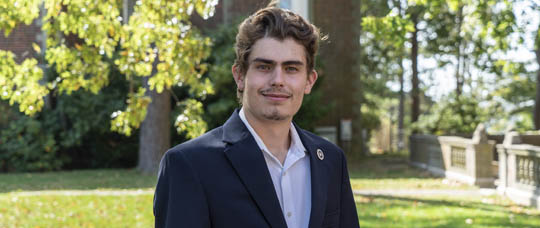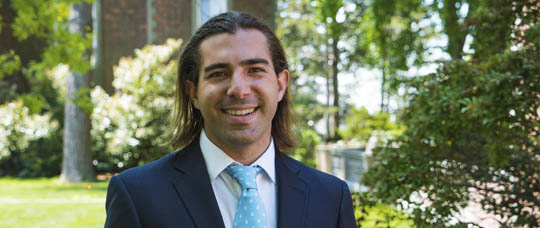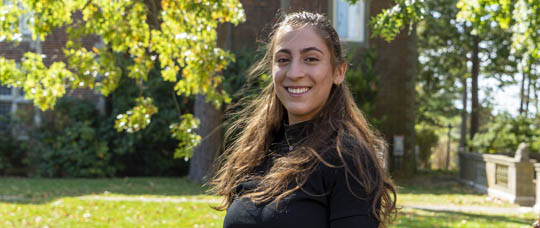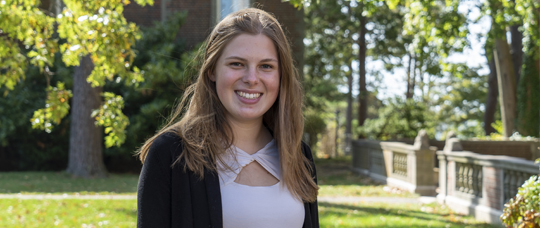Senior Spotlight: Alex Koziol ’21
Hometown: Wallingford, PA
Thesis Title: Metaheuristic Algorithms in Concept Design: Optimization of Marine Electrical Systems
Post Graduate Plans: Staff Naval Architect with Glosten in Providence and New York
Do you have any advice for incoming students?
Spend at least one winter work alone in a new city and make as many friends as you can. Then spend another with a house full of Webbies and enjoy all the free time. Join the dinghy sailing team, even if you don’t know how to sail. Learn to code in your free time so you can do a fun thesis with Professor Martin!
What’s your favorite spot on campus and why?
My favorite spot would have to be the top of the west-side fire escape with the view of the city skyline at night. My second favorite would be the reading room. Sometimes I forget that we live in a gold coast mansion.
What will you miss the most about Webb?
I’ll miss the people the most. I chose to come here mostly because of the small student body, the culture that comes with it, and the ethos of the Honor Code, and I wasn’t disappointed.
Favorite Quote.
Ellen: “Clark, Audrey is frozen from the waist down.”
Clark: “That’s all part of the experience, honey.”
What was your favorite Winter Work internship?
My favorite internship was with Navatek (now Martin Defense Group) in the better Portland (Maine). Portland is beautiful and really easy to get around without a car. The people there were very kind and I really value the friends I made there. There’s also have some excellent beer!
Senior Spotlight: Dillon Esposito-Kelley ’21
Hometown: Sayville, NY
Thesis Title: A Simulated Optimization and Feasibility of a Thermoacoustic Engine in the Marine Environment
Post Graduate Plans: Work at NASSCO.
What will you miss the most about Webb?
The classroom vibes.
Favorite Quote.
“I have always found that plans are useless, but planning is indispensable.” – Dwight D. Eisenhower
What activities were you involved with at Webb?
Tennis!
What are you passionate about?
Rock climbing, reading, Doritos, and procrastinating.
What was your favorite class at Webb and why?
Statistics, it is an interesting topic that can be widely used and applied.
Senior Spotlight: Jackson Juska ’21
Hometown: Avalon, NJ
Thesis Title: A Seakeeping Study of the Gyroscopic Effect of a Wind Turbine Rotor on a Moored Tension Leg Platform
Post Graduate Plans:
I am launching on an 11-month Christian mission trip, The World Race, serving needs in Central America, South America, and Southeast Asia.
What have you learned from other students?
“The work always gets done” – no matter how much work you have, never sacrifice spending time with the ones you love. Never skip a beautiful sunset, never miss a good wakeboarding day, help someone out every chance you have, when Webb loses power do not do your homework, the list goes on. I can’t remember the pain of the all-nighters but I will never forget the fun times with others.
Why did you choose Webb?
I originally chose Webb because I love engineering and the water. I also thought there was no way I could pass up possibly one of the most unique four years I will ever have. I had no idea what I was getting myself into. And honestly, Webb never ceases to surprise me. My original reason for staying only lasted a few weeks into freshmen year. I’m still here because I love the people, I love and appreciate the opportunities, and in a weird way it’s pretty fun.
What’s your favorite spot on campus and why?
My favorite part of campus is in the water about 100 yards off the Webb beach and looking up at the mansion overlooking the water.
Favorite Quote.
I have a couple: “Due tomorrow? Do tomorrow!”, “Ben how do I find this number for the homework? Ben: Carefully…”, “it will be done in two weeks”, “It’s always push”, “We have a WOJO tomorrow”, “Welcome to Webb!”, and many others.
Senior Spotlight: Lina Tenenbaum ’21
Hometown: Brooklyn, NY
Thesis Title: Airport Ferries: A Feasibility Study and Concept Design of a New York Airport Ferry
Post Graduate Plans: International Seaways as a Sustainability Engineer
Favorite Quote.
“If you don’t know where you’re going, any road will take you there.” – George Harrison
What’s your favorite spot on campus and why?
It’s not there anymore, but my favorite spot used to be the big cherry blossom on the first terrace. I enjoyed doing homework under it as the sun went down. It was also always filled with hammocks.
Do you have any advice for incoming students?
Don’t let impostor syndrome get to you: if you got into Webb, you deserve to be here. Work hard and put in the time, and you’ll get a lot out of the experience.
What would be the best job for you?
A keyboard player for a band on a world tour.
Senior Spotlight: Addie Lindyberg ’21
Hometown: Stockton Springs, ME
Thesis Title: Ride the Wind: A Seakeeping Study of the Gyroscopic Effect of the Wind Turbine Rotor on a Moored Tension-Leg Platform
Post Graduate Plans: Viking Systems
What was your favorite Winter Work internship?
My favorite internship was my sea term. I was on the M/V Cape Horn (a MARAD Ready-Reserve Ro-Ro) in San Francisco. Although it didn’t go anywhere, there was a lot of work to do because the ship is very old (built in 1979).
What was your favorite class at Webb and why?
My favorite class was Egyptology, which I took as my junior year humanities elective. I liked the technical classes too, but we take so many technical classes that it can sometimes be very draining. Taking Egyptology really reignited my love for learning, and reminded me that there is a lot more to learning than just getting a good grade and a degree.
Do you have any advice for incoming students?
Get involved in things that you are passionate about. There are so many opportunities to get involved in the Webb community in many different ways through student government, leadership committee, athletics, etc. Focus on the things that you are passionate about, and don’t worry too much about the workload.
What’s your favorite spot on campus and why?
My favorite spot on campus is the yacht club. It is the best place to go to take a break from work. Some of my best memories at Webb are taking out the whalers, swimming in the sound, and trying to learn how to sail.

